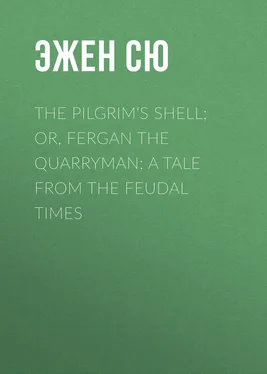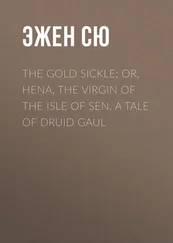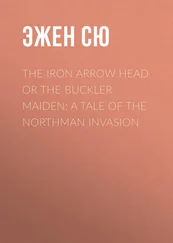Эжен Сю - The Pilgrim's Shell; Or, Fergan the Quarryman - A Tale from the Feudal Times
Здесь есть возможность читать онлайн «Эжен Сю - The Pilgrim's Shell; Or, Fergan the Quarryman - A Tale from the Feudal Times» — ознакомительный отрывок электронной книги совершенно бесплатно, а после прочтения отрывка купить полную версию. В некоторых случаях можно слушать аудио, скачать через торрент в формате fb2 и присутствует краткое содержание. Издательство: Иностранный паблик, Жанр: literature_19, foreign_antique, foreign_prose, на английском языке. Описание произведения, (предисловие) а так же отзывы посетителей доступны на портале библиотеки ЛибКат.
- Название:The Pilgrim's Shell; Or, Fergan the Quarryman: A Tale from the Feudal Times
- Автор:
- Издательство:Иностранный паблик
- Жанр:
- Год:неизвестен
- ISBN:нет данных
- Рейтинг книги:3 / 5. Голосов: 1
-
Избранное:Добавить в избранное
- Отзывы:
-
Ваша оценка:
- 60
- 1
- 2
- 3
- 4
- 5
The Pilgrim's Shell; Or, Fergan the Quarryman: A Tale from the Feudal Times: краткое содержание, описание и аннотация
Предлагаем к чтению аннотацию, описание, краткое содержание или предисловие (зависит от того, что написал сам автор книги «The Pilgrim's Shell; Or, Fergan the Quarryman: A Tale from the Feudal Times»). Если вы не нашли необходимую информацию о книге — напишите в комментариях, мы постараемся отыскать её.
The Pilgrim's Shell; Or, Fergan the Quarryman: A Tale from the Feudal Times — читать онлайн ознакомительный отрывок
Ниже представлен текст книги, разбитый по страницам. Система сохранения места последней прочитанной страницы, позволяет с удобством читать онлайн бесплатно книгу «The Pilgrim's Shell; Or, Fergan the Quarryman: A Tale from the Feudal Times», без необходимости каждый раз заново искать на чём Вы остановились. Поставьте закладку, и сможете в любой момент перейти на страницу, на которой закончили чтение.
Интервал:
Закладка:
"You are right, Jeronimo," observed the Bishop of Nantes. "But do you not fear that the seigniorial station, thus stripped, shrunk and ruined, will leave the place open for the royalty, to-day without power, and that that royalty will not endeavor to share with us the dominion of the people, and will not even strive to dominate the Church?"
"We need not fear the rivalry of the Kings. Even their private interests are to us a safe guarantee of their submission to the will of the Pope, the representative of God on earth, the dispenser of eternal rewards or punishments."
"Oh, Jeronimo, your words have opened a new horizon before me. I see now the future of the Catholic Church in all her formidable majesty. I now cleave to life, and would wish to assist at that magnificent spectacle."
"This topic has a close bearing upon our present position of prisoners of Neroweg VI, and you must inspire yourself with it, Simon, to the end that you may regulate your conduct accordingly."
"Tell me what I am to do, Jeronimo. I can take no more precious a guide than you in all matters concerning our holy religion."
"Neroweg relies upon your torture to extort from you the possession of the domains of your diocese, which he has long coveted. Accede to all that he may demand. Peter the Hermit and Walter the Pennyless will not be long in arriving in this region to preach the Crusade. Neroweg will depart for Jerusalem, and will not be able to profit from the concessions you will have granted."
"But say he insists upon putting me to the torture to glut his thirst for revenge upon me! I shudder at the prospect."
The conversation between the Bishop of Nantes and the monk was here interrupted by a rumbling and weird noise, that seemed to proceed from the interior of the thick wall. The two prelates trembled with affright, and looked at each other. Then, drawing near the wall in the direction from which the noise came, they applied their ears with bated breath. But the noise slowly receded, and a few minutes later died away completely.
CHAPTER VIII.
THE CHAMBER OF TORTURE
The dungeon of Bezenecq the Rich and his daughter, vaulted and floored with stone slabs like the other subterranean cells, but located on the second story of that redoubtable structure, received a somewhat better light from its narrow loop-hole. In the center of the cell stood a gridiron, six feet long, three wide, raised a good deal above the floor, and constructed of iron bars placed slightly apart from each other. Chains and rings, fastened to the gridiron, served to keep the victim in position. Near this instrument of punishment rose two other engines of torture, devised with ingenious ferocity. The one consisted of a projecting iron bar, in the nature of a gibbet about seven or eight feet above the floor, and terminating in an iron carcan that opened and closed at will. A heavy stone, weighing about two tons, and furnished with a ring and a strap to hang it by, lay at the foot of the gibbet. The other engine had the appearance of a gigantic prong, sharp and turned back similar to those used by butchers to hang their quarters of beef on. The slabs of the flooring, covered everywhere else with greenish moisture, wore a blood-red tint under the prong. Opposite to this instrument of punishment, there was grossly sculptured on the wall, a sort of grinning mask, hideous, half beast, half human; its eyes and the cavity of its gaping mouth, resembled deep black holes. Finally, close to the door of the cell stood a wooden box full of straw, and there lay the daughter of the townsman of Nantes, colorless like a corpse, and frozen with terror. At times her body shook with convulsive shivers, other times she remained motionless, her eyes shut, without, therefore, however, her tears ceasing to stream down her cheeks. Bezenecq the Rich, seated on the edge of the straw bed, his elbows on his knees and his forehead hidden in his hands, was saying to himself: "The seigneur of Plouernel… A descendant of Neroweg!.. Strange, fatal encounter!.. Woe is us!"
"Oh, father," murmured the maid in a fainting voice, "this encounter is our sentence of death."
"The sentence of our ruin, but not of our death. Calm yourself, poor child, the seigneur of Plouernel knows not that our obscure family, descended from the Gallic chieftain Joel, who made a head against Cæsar, has been at strife with his own all through the past ages, since the Frankish conquest. But when that bailiff pronounced the name of Neroweg VI, which I had not heard mention during this ill-starred journey, and when, questioned by me, that man answered his master belonged to the ancient Frankish family of Neroweg, established in Auvergne since the conquest of Gaul by Clovis, I no longer had any doubts, and, despite myself, I shuddered at the recollection of our family records, which our father once read to us at Laon, and that have remained in that country, in the hands of Gildas, my elder brother."
"Oh, why did our grandfather leave Brittany. Our family lived there so happy."
"Dear child, our grandfather, who lived near the sacred stones of Karnac, the cradle of our family, could no longer endure the oppression of the Breton seigneurs, who had grown to be as cruel as their Frankish fellows. He sold his little havings, and embarked with his wife at Vannes on a merchant vessel bound for Abbeville. He settled down in that city, where he set up a modest trade. Later, my father moved into the province of Picardy, and settled at Laon, where my elder brother Gildas still carries on the currier's trade. Coming by sea from Abbeville to Nantes to traffic in the articles of our trade, manufactured in Laon, I became acquainted with your mother, the daughter of the merchant to whom I was directed. Her parents did not wish to part from her. They made me promise not to leave Nantes. I became the partner of my wife's father, and grew rich in the business. Your mother then died. You were still a child. Her death was the greatest sorrow of my life. But you were left to me. You grew in gracefulness and beauty. Everything smiled upon me again. I was happy. And behold us now, while yielding to the wishes of your grandmother – " and Bezenecq interrupted himself with a cry of despair: "Oh, it is frightful!"
"But how could we have merited the terrible punishment that seems reserved to us?"
"Oh," replied the bourgeois of Nantes with a sigh, "my happiness rendered me forgetful of the misfortune of our brothers! I was selfish!"
"Dear father, you surely exaggerate the faults or errors of your life."
"Millions of serfs and villeins people the lands of the seigneurs and the clergy. Among them, some drag along a painful existence, that ends in death from exhaustion and misery; others are hanged from the patibulary forks. Those unhappy people are Gauls like ourselves. If some townsmen live in tranquility in the cities, when they have for seigneur so gentle a master as Simon of Nantes, millions of serfs and villeins, on the other hand, are devoted to all the miseries of life, and victims to the seigniories and the Church."
"But, father, it did not depend upon you to alleviate the ills of these wretched folks."
Конец ознакомительного фрагмента.
Текст предоставлен ООО «ЛитРес».
Прочитайте эту книгу целиком, купив полную легальную версию на ЛитРес.
Безопасно оплатить книгу можно банковской картой Visa, MasterCard, Maestro, со счета мобильного телефона, с платежного терминала, в салоне МТС или Связной, через PayPal, WebMoney, Яндекс.Деньги, QIWI Кошелек, бонусными картами или другим удобным Вам способом.
Читать дальшеИнтервал:
Закладка:
Похожие книги на «The Pilgrim's Shell; Or, Fergan the Quarryman: A Tale from the Feudal Times»
Представляем Вашему вниманию похожие книги на «The Pilgrim's Shell; Or, Fergan the Quarryman: A Tale from the Feudal Times» списком для выбора. Мы отобрали схожую по названию и смыслу литературу в надежде предоставить читателям больше вариантов отыскать новые, интересные, ещё непрочитанные произведения.
Обсуждение, отзывы о книге «The Pilgrim's Shell; Or, Fergan the Quarryman: A Tale from the Feudal Times» и просто собственные мнения читателей. Оставьте ваши комментарии, напишите, что Вы думаете о произведении, его смысле или главных героях. Укажите что конкретно понравилось, а что нет, и почему Вы так считаете.












